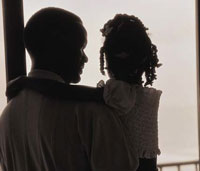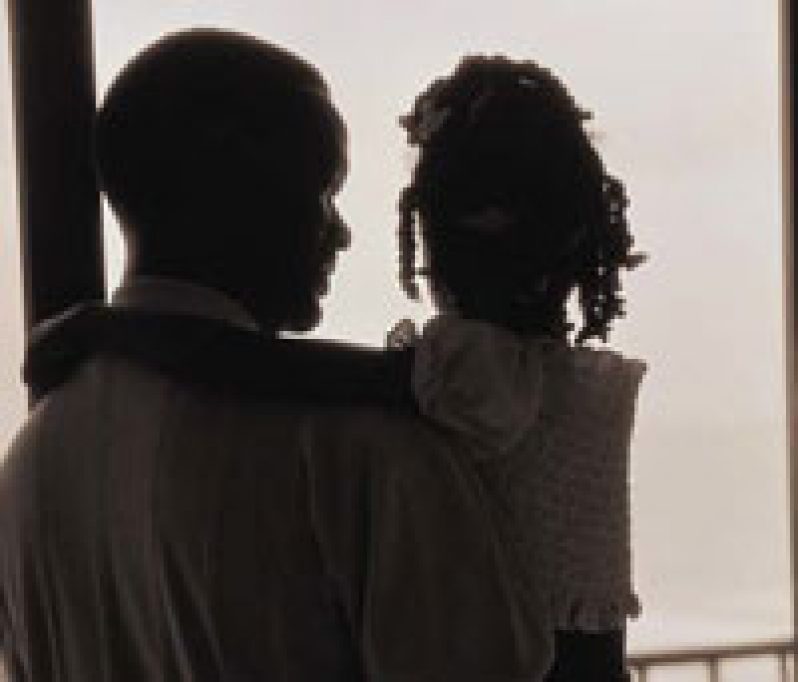THIS story is about a father, who, after losing his children’s mother in childbirth, handed over temporary custody of his three-year old daughter to the child’s aunt and husband, who subsequently waged a successful legal battle against him for permanent custody.
 The father lost because he failed to demonstrate that adequate arrangements had been made, or would be made, in his home for care of the child, Anikka.
The father lost because he failed to demonstrate that adequate arrangements had been made, or would be made, in his home for care of the child, Anikka.
According to the facts, the Applicant, Clifton De Jonge, had for 19 years been employed as a Crusher/Operator at the Linmine Bauxite Mill. Between 1975 and 1990, he fathered six children in a common-law union. The mother died at childbirth when delivering the sixth child, a daughter named Sheridan Anikka, on September 13, 1990.
A few days after the child was born, De Jonge voluntarily handed her over to her mother’s sister and the latter’s husband, the respondents in his petition, with the understanding that the arrangement was a temporary one. The Respondents, however, expressed their intent to have continuous custody, and to legally adopt the child.
Having failed in their efforts to reach agreement with De Jonge, the Applicant, the Respondents began adoption proceedings, the result of which was a Consent Order on June 11, 1992 that custody of the child remain with the Respondents, with access to the Applicant at defined times.
The arrangements recorded in the Order of the Chief Justice worked smoothly for only two months, and thereafter became problematic. In April 1993, the Applicant sought revocation of the Consent Order, in favour of one granting him custody and guardianship of the child.
But Justice Vidyanand Persaud, before whom the matter was brought, held that the child was well cared for by the respondents, and arrangements had been made for her to attend nursery school. And besides, the Applicant had failed to demonstrate that adequate arrangements were or would be in place in his home for the care of the child, if custody was awarded to him.
In the circumstances, he ruled that the Order made by Justice Bishop on June 11, 1992 remain in force, with liberty to apply reserved to the parties for the settling of any alternative scheme of access.
De Jonge, the child’s father, was represented by Attorney-at-Law, Mr. Winston Moore, while the child’s maternal relatives, the respondents, were represented by Ms. Sheila Chapman.
As Jusctice Persaud observed during the delivery of his judgment:
“There was not really a right solution; there were two alternative wrong solutions. The problem for the Judge was to appreciate the factors in each direction, and to decide which of the two bad solutions was the least dangerous, having regard to the long-term interests of the children… ”
Citing another matter that bore certain similarities to the one at hand to bolster his argument, he said:
“This lament of Cumming-Bruce, L.J. on the task of the trial judge in Clarke-Hunt v. Newcombe [1983] 4FLR 482, typifies the dilemmas encountered by the Courts when adjudicating in disputes involving custody of children.”
Clearly uncomfortable with the decision he had to make, Justice Persaud said:
“It is my agonizing duty, in this case, to undertake such a task. I am only too aware that my solution may mot be one that is ideal for the child, but rather one that is the best that can be arrived at in the circumstances.
“My task is made even more daunting by the recognition of the fact that I stand alone in exercising the direction vested in me and that (as Wooding, C.J. cautioned in Leong Quen v. Bramble [1965] 8 WIR 149 at p 151) I must not succumb to the temptation to defer, nolens volens, to the exercise by another of a like discretion on other facts however similar.
“In the peculiar circumstances of this case, the background to the dispute was not contained in the affidavits before me, and so, initially, I invited counsel on both sides to fill this gap by oral presentation in Chambers.
“This outline, coupled with the evidence adduced in Open Court, will induce a feeling of déjà vu in anyone who had cause to peruse the Reports on custody cases.”
Launching into a blow-by-blow account of what led to the matter before him, Justice Persaud said:
“The Applicant, Clifton De Jonge, has, for the past nineteen years, been employed as a Crusher/Operator at the Linmine Bauxite Mill.
“During the year 1974, he commenced living in common law union with one Olive Reynolds at Amelia’s Ward, Linden. There were six children of this union, five of whom were born during the period 1975 to 1983. Olive Reynolds was delivered of the sixth child, a daughter named Sheridan Anikka, on September 13, 1990, and tragically died in childbirth.
“Pamela Saul, a senior mistress of a primary school, is the younger sister of the deceased, Olive Reynolds, and the wife of Lennox Saul, an Inspector of Police. The Sauls (hereinafter referred to as the Respondents) live together, and work in Georgetown.
“A few days after the birth of Sheridan Anikka, the Applicant voluntarily handed over the child to the Respondents. His assertion that he expressly stated at the time of such handing over that the arrangement was a temporary one was disputed by the Respondents; they were emphatic, in their averment, that the Applicant concurred with their expressed intention to have continuous custody of the child, and to legally adopt her.
“The question of whether the Applicant’s giving up custody was permanent or transient is of no great moment; if he had in fact initially indicated his agreement, as alleged, this would not be binding on him. A plea of estoppels* cannot be maintained against a parent in these circumstances.
“Although such a verbal agreement is not binding upon a parent, still, where such agreement has been acted upon for several years, and the child is better situated, at the home of adoption than she would be with her parents, the Court, having regard for the child’s welfare, will not restore the custody of a child to the parent.
“This approach was adopted, for example, by the British Columbia Supreme Court in Re Whitfield [1922] 70 DLR 658, when the Court refused to return an eleven-year-old child to her father, who, on the death of his wife six years previously, had given custody of the child to the couple.
“In any event, pursuant to the handing over of the child by the Applicant, the Respondents took her to their home in Georgetown, where she has since been residing.
“During the year 1991, the Respondents visited the Adoption Board and initiated adoption proceedings in respect of the child. The Applicant complained that this was a clandestine exercise, and that he only became aware of those proceedings when his attention was adverted to a notice in the newspapers requesting anyone knowing of his whereabouts to so inform the Adoption Board. He thereupon visited the Board, and registered his dissent to the proposed adoption, thereby effectively aborting same.
“During January 1992, the Respondents renewed their attempt to secure legal custody of the child. They filed a summons to the High Court, seeking an Order to dispense with the consent of the Applicant to their proposed adoption of the child. The summons was served on the Applicant, and came up for consideration before Bishop C.J. on June 11, 1992…
“On this date, the Adoption proceedings were formally discontinued, and it was, by consent, ordered that custody of the child remain with the Respondents, with access to the Applicant at defined times.
“The Respondents undertook to assist in defraying the expenses incurred by the Applicant in travelling between Linden and Georgetown to exercise the right of access.
“The arrangement, recorded in the Order of the Chief Justice, worked smoothly for only two months, and thereafter became problematic. There were complaints on both sides that the terms of access were breached, and strongly worded letters were sent, on behalf of both parties, threatening contempt proceedings. Further, there was dispute over the traveling assistance, and controversy over police involvement, the Respondents viewing Police intervention as having been necessary to secure due compliance with the terms of the Consent Order, and the Applicant deeming same to be harassment engineered by Mr. Saul.
“The culmination of all this was the institution, in April, 1993, of the summons now before me, wherein the Applicant is seeking the revocation of the Consent Order of June 11, 1992, and an Order granting him custody and guardianship of the child.”
After delving into all aspects of the case, Justice Persaud was of the view that the Applicant failed to demonstrate that adequate arrangements were or would have been in place in his home for the care of the child, if custody was awarded to him .
As such, in addition to refusing to accede to the Orders sought by the Applicant etc, Justice Persaud declared that since the paramount consideration in this case was the welfare of the child, it could not be said that one party or the other was the “winner or loser”. “It is my hope,” he said, “that with the passage of time, the differences between the parties may be resolved, and that they will collaborate to further promote the interests of the child.”
*A term in Law in reference to the principle which precludes a person from asserting something contrary to what is implied by a previous action or statement of that person, or by a previous pertinent judicial determination.












